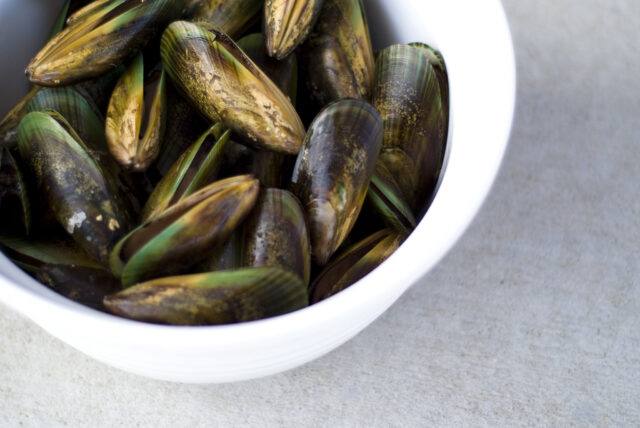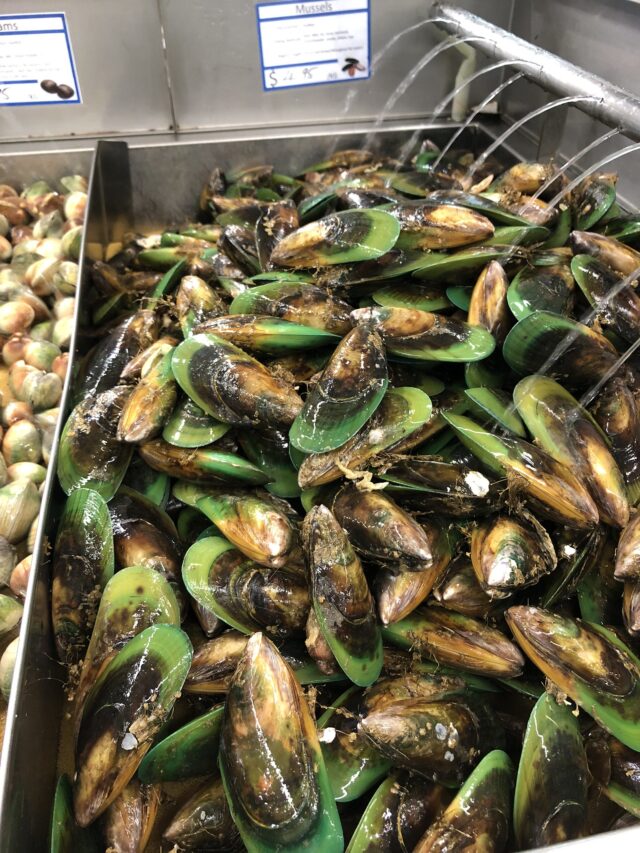Dogs of all ages can suffer from joint pain and mobility issues. Arthritis is the number one chronic pain dogs face, affecting even young dogs. No dog should have to suffer silently every time they walk, which is why dog parents are doing everything they can to prevent future joint pain. There are many joint products on the market, but green lipped mussels for your dog could be a safe, natural option.
Most people have never heard of green lipped mussels. Yet, these mollusks have a long history of aiding human joints. So, researchers have found that the same properties may work for dogs as well. Let’s look at how these unique creatures can benefit your dog and how you can safely serve them.

What are Green Lipped Mussels?
Green lipped mussels, also known as GLM, are a mussel species native to the coast of New Zealand. They’re named after the bright green stripe that lines the edge of the shell. They’re a natural filter for seawater, so they soak up many nutrients and minerals. These potent mussels are relatively small, but they have massive health benefits.
New Zealand natives have long used green lipped mussels. The Maori, the indigenous Polynesian people of New Zealand, started consuming the mussels centuries ago. Eventually, scientists realized that their arthritis rates were much lower than those living on the mainland. The key difference seemed to be the green lipped mussels.
At first, scientists were unable to uncover much about green lipped mussels because they could only look at the meat rejected after processing. However, when they could freeze-dry mussels in the 1980s, they uncovered more about what the mussels contained. They realized that the initial testing didn’t show that the mussels were rich in omega fatty acids and other beneficial nutrients.
After further research, scientists learned how these mollusks were benefitting human joints. Green lipped mussels seem to have a similar effect on the average dog too.

Are Green Lipped Mussels Good for Dogs?
Yes, green lipped mussels are good for dogs. They’re rich in beneficial nutrients, such as glucosamine and chondroitin, along with vitamins, minerals, and antioxidants. All of these items can improve your dog’s joints, and they may be able to benefit them in other ways too.
Even though green lipped mussels aren’t common, they may be a safer alternative to non-steroidal anti-inflammatory drugs (NSAIDs) used for dog joint pain. They’re a natural option with fewer side effects. They can help with all kinds of joint concerns, including arthritis, luxating patella, hip dysplasia, and any general mobility pain.
A 2009 study demonstrated the improvements of arthritis in dogs taking these mussels. The dogs took green lipped mussels for eight weeks and were evaluated four different times. The dogs who took the mussels showed a significant advance in joint health compared to the control group. Those improvements continued for four weeks after the dogs stopped taking the mussels.
All the studies that have been done with green lipped mussels and dogs have shown that the mussels have no significant risks for canines.
How Can Green Lipped Mussels Benefit Your Dog?
The main benefit of green lipped mussels for dogs is relieving joint pain. At least one in five dogs suffers from worsening osteoarthritis, so taking a joint supplement may reduce that risk. Joints only deteriorate as dogs get older, so it’s best to give them relief at an early age.

Here are some specific benefits of green lipped mussels for dogs:
- Has natural inflammatory properties
- Reduces joint pain
- Protects, builds, and repairs cartilage
- Boosts dog immunity
- Makes bones stronger
- Prevents arthritis
- Prevents slow damage to cells
- Supports joint tissue
It’s hard to believe that some mussels can do the same work as prescribed medications, but many dogs have experienced positive results because of them. Scientists examined what makes these mussels strengthen joints to understand better how they work.
Dogs suffering from joint pain may experience limping, flinching when touched near joints, reluctance to walk, or inability to climb stairs. Even if your dog shows no signs of pain, joint supplements can still reduce their risk of mobility issues in the future. Arthritis affects 20% of dogs over one-year-old and 80% of dogs over eight years old.
How Do Green Lipped Mussels Benefit Joints?
Green lipped mussels include all the ingredients you’d find in joint supplements and more. Some beneficial items include glucosamine, chondroitin, omega-3 fatty acids, zinc, copper, iodine, manganese, and vitamin B12. Glucosamine and chondroitin make up glycosaminoglycans (GAGs), which can protect dog joints from wear and tear.

Dog joints are surrounded by capsules that have water in them. More water in the case means more protection for the joints. So, chondroitin can strengthen those capsules and give them more space to hold water. Even a month after taking green lipped mussels, the GAGs can still protect your dog’s joints.
Then, omega-3 fatty acids in the mussels give them anti-inflammatory effects. Omega fatty acids are most commonly associated with keeping a dog’s skin and coat healthy, but there are actually 90 different types of fatty acids in green lipped mussels. Eicosapentaenoic acid (EPA) and docosahexaenoic acid (DHA) are the ones that are crucial for preventing inflammation.
Can Green Lipped Mussels Replace Medications?
NSAIDs are often given to decrease inflammation in dogs, which is something green lipped mussels are used for. You may be able to provide these mussels instead of medication because they have additional benefits.
Even though NSAIDs can help your dog feel better by reducing inflammation, they could cause additional problems. Some medications destroy cartilage and liver lining, especially if taken in high doses. Less cartilage can cause more damage to the joints, making the drugs counterintuitive in some instances. Green lipped mussels don’t cause these potential risks.
In fact, green lipped mussels build healthy cartilage to help strengthen joints. Thus, they do more than decrease inflammation because they can use other beneficial ingredients to prevent joint problems from developing. They have fewer risks and side effects than most medications, which is why they might be the better alternative.

However, you should always consult your vet before switching to a different remedy. Certain situations may require a medication instead of mussels, so your vet can give you the best advice based on your dog’s health.
Green Lipped Mussels for Dogs Dosage
The dosage of green lipped mussels for dogs can vary based on how you serve it and what your dog needs it for. Most experts suggest that you should give your dog about 15 to 20 mg for every pound of body weight.
Here are the suggested green lipped mussel doses for dogs:
- 10 pounds or less – 200 mg
- 11 to 25 pounds – 400 mg
- 26 to 50 pounds – 800 mg
- 51 to 75 pounds – 1,200 mg
- 76 pounds or more – 2,400 mg
You only need to give your dog a dose once per day. If you buy a supplement that has green lipped mussels in it, the recommended dose will be on the container. Of course, if you’re ever uncertain how much to give your dog, you can consult your vet.
After giving your dog their first few doses, you may choose to increase or decrease their dosage slightly based on how it affects them.
Are There Any Side Effects of Green Lipped Mussels?
There are no known side effects of green lipped mussels for dogs, so they’re the safer alternative to medications. But like all new supplements, you should be cautious when first giving them to your dog. Pay close attention to your furry friend’s behaviors and contact your vet if anything seems unusual.

While it’s not necessarily a risk, it’s important to note that not all green lipped mussels are equal. Some green lipped mussel products don’t have enough fatty acids in them to make a significant impact on your dog’s joints. When choosing a product, look for mussels with at least 6% omega fatty acids. Otherwise, the supplement might not do much for them.
Green lipped mussels can also take more time to have an impact than NSAIDs. Yet, many dog parents agree that it’s worth it for the lower risk of adverse effects. If you know your dog is allergic to shellfish, ask your vet about other safe remedies instead.
Is it Safe to Take with Medications?
Green lipped mussels can be taken with any other medications. There are no reported drug interactions with these items. They’re even safe for dogs of all ages to consume, but no one has researched if the mussels are safe for pregnant or lactating dogs yet.
Finding Quality Green Lipped Mussels
As mentioned earlier, not all green lipped mussels are created equal. The way they’re sourced, harvested, and manufactured can play a role in how nutritious they are. That’s how some mussels end up with fewer nutrients, such as a lower percentage of fatty acids.
Green lipped mussels are one of the most sustainable forms of aquaculture, but where they’re sourced from can affect their quality. To guarantee a high percentage of omega-3 fatty acids, the mussels should come from a reputable farmer in one of the best-performing areas. The farmers should know the best time to harvest the mussels in each bay.
All products are manufactured differently, but it’s important to ensure the nutrients aren’t cooked out of the mussels. Many companies freeze-dry the mussels, which may slightly damage the nutrients, but not enough to ruin the quality. However, using a rapid vacuum-drying process is more likely to keep all the essential ingredients safe. Cooking the mussels for too long may remove too many nutrients.

The company should also have a solid quality check before the supplements go on the market. Many companies will test the levels of all the characteristics, including bioactivity, oxidative stability, and the levels of all the omega fatty acids. It might be challenging to find out all the manufacturing information of these products, but if you can, it could help you make an educated decision.
How Can You Serve Green Lipped Mussels to Your Dog?
The most common way to serve green lipped mussels to pets is to use joint powder. It might not be appealing to your dog on its own, but you can sprinkle it on their food to give them the benefits. The powder is usually made of 100% green lipped mussels. The mussels can also be freeze-dried, which is a great way to keep the nutrients intact. Freeze-dried whole mussels can be a crunchy snack for dogs.
Some joint supplements also include green lipped mussels as one of their beneficial ingredients. Supplements in the form of treats are great for picky eaters because your dog will think they’re getting a snack instead of a healthy meal enhancer. You may even find some dog food with green lipped mussels as an ingredient.
Whichever type of supplement you choose, it’s a good idea to talk to your vet about it first. Also, check the label yourself to ensure that it only includes safe, beneficial ingredients.
Picky Dogs Rejoice!
If you’re worried about your dog’s joints but they’re uninterested in most supplements, giving green lipped mussels in the form of a treat might be beneficial for them. Of course, you’ll still want to make sure you choose a reliable company that uses ingredients you feel comfortable giving to your dog.
The iHeartDogs Advanced 8-in-1 Hip & Joint Chews are a great way to improve your dog’s mobility without them realizing they’re taking a supplement. The eight key ingredients are Glucosamine HCI, omega-rich organic hemp powder, MSM, chondroitin, green lipped mussels, organic turmeric, and Boswellia serrata. Together, they can help reduce inflammation and improve joint function.
These tasty chews can help reduce pain, prevent long-term damage, and improve mobility. Plus, every bag sold provides 14 healthy meals for shelter dogs. So, helping your pup’s health can also benefit dogs in need!
It’s heartbreaking to watch your dog struggle with joint pain, especially when some medications only seem to make it worse. If you’re worried about your furry friend’s mobility, green lipped mussels might be the solution. These special New Zealand mollusks are a safe, natural way to prevent arthritis for both humans and dogs.

